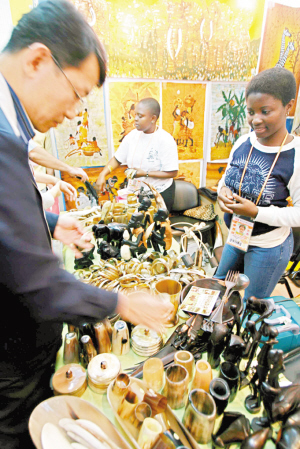Exporters from nine of the world's less-developed countries have joined the nation's biggest trade fair being held in Guangzhou, capital of southern Guangdong Province.

An African booth (Guangzhou Daily photo)
"The fair has provided the nine countries with booth space of about 300 square meters free of charge," said Xu Bing, a spokesperson of the fair.
The move aims to help exporters from the impoverished countries find business opportunities in China, according to Xu.
A total of 19 companies specializing in materials, agriculture, food and beverages and handicraft are attending the fair. Participants include Laos, Sudan, Rwanda, Madagascar, Nepal, Chad, Cambodia, Haiti and Uganda.
Formerly the called the China Export Commodities Fair, it has changed its name to the China Import and Export Commodities Fair and set up booths for foreign sellers at its 101st event earlier this year in an attempt to boost imports.
"It's my first time to China and I will be satisfied even if I find only one customer here," said businesswoman Chantal Karungi from Rwanda.
Karungi sold handcrafts and hand-made blankets and she was optimistic about her products' performance on the Chinese market.
"All my goods are hand-made," she said. "Many Chinese customers are interested in our products and we have saved each other's contact information for further negotiation."
In recent years, China's imports from African countries have increased dramatically. In late 2003, it also removed tariffs on 190 commodities imported from the 25 least-developed African countries, such as Tanzania, Zambia and Mali.
As of the end of last year, China has imported tariff-free commodities worth about US0 million from these countries. The goods include sesame, copper products and coffee beans.
China announced that 454 items of commodities from 26 African countries are exempted from tariffs from July 1 this year, covering almost all the exported products to China from these countries.
According to the United Nations list of least-developed countries, there are 50 countries in the category, three-quarters of them in Africa.




